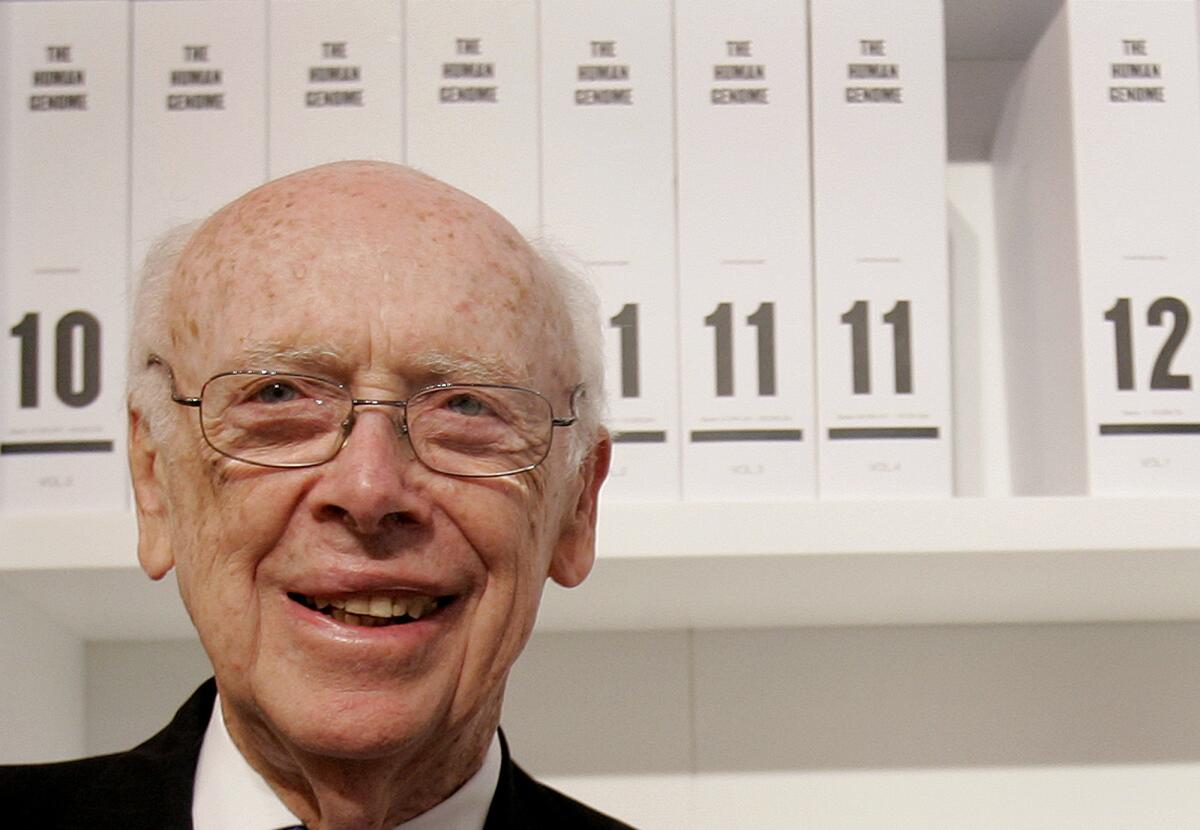A great scientist’s fall into crankdom: The case of DNA pioneer Jim Watson

- Share via
Word emerged over the weekend that James D. Watson, whose co-discovery in 1953 of the structure of DNA is one of the landmarks of 20th-century biological science, is putting his Nobel Prize medallion up for auction.
The sale of the medal he received for sharing the 1962 prize with his partner Francis Crick is scheduled to take place Thursday in New York, where it’s expected to raise as much as $3.5 million. Watson, now 86, says he might donate some of the proceeds to his alma mater, the University of Chicago, or buy some fine art. He also says he needs the money, because he’s been shunned by the scientific establishment since unburdening himself of some impolitic and scientifically ludicrous thoughts on race and intelligence in 2007.
Indeed, it’s the contrast between Watson’s unquestionable achievement in helping to identify DNA’s structure as a double helix, and his openly retrograde opinions on race and gender, that have ended up defining his public image.
It’s worth pondering, however, if the greater flaw is in his character, or in modern society’s tendency to treat high achievers in some fields as universal sages. At one end of the achievement scale, we have Hollywood stars testifying before Congress on issues relevant to their on-screen characters (the “I’m not a doctor but I play one on TV” phenomenon). At the other, it’s the spectacle of Nobel-winning scientists turning out to be troglodytic cranks the moment they stray from their narrow specialties.
Watson, obviously, is of the latter breed, as was William Shockley, another laureate (for co-inventing the transistor) who became known chiefly for his paranoid and corrosive views on “The Negro I.Q.” Watson was always outspoken and conceited -- the irony of his classic 1968 memoir, “The Double Helix,” is that it opens with the words: “I have never seen Francis Crick in a modest mood”--but he never learned to keep his mouth shut even when he had nothing useful to say. (I never met Watson, but I did meet Crick not long before his death in 2004, and found him a charming, gracious and still-inquisitive scientific elder statesman.)
Laura Helmuth of Slate.com has assembled a tolerably complete list of Watson’s “ignorant, prejudiced statements” and their consequences to his career. They make sad reading, in part because they’ve reverberated back to undermine assessments of his genuine accomplishments.
The key moment came in 2007, when he told the Sunday Times of London in an interview that he was “inherently gloomy about the prospect of Africa” because “all our social policies are based on the fact that their intelligence is the same as ours – whereas all the testing says not really.” He added that although people wished to believe that everyone was born with equal intelligence, those “who have to deal with black employees find this not true.”
The comments effectively ended Watson’s public career. He was denounced by eminent colleagues and stripped of his post as chancellor of New York’s Cold Spring Harbor. There, during the height of his renown, he had launched the federally-funded, $6-billion Human Genome Project, which probably could not have gotten off the ground without his sponsorship. But subsequently, as he told the Financial Times last week, he became an “unperson.”
What had happened was that the private James Watson had become public. The pages of “The Double Helix” bristle with his cocksure philistinism toward women. At a 2000 colloquium at Berkeley, Watson infuriated the audience by repeating sexist and racist slurs. (That said, Slate’s Helmuth probably overstates the case in blaming Watson for denying credit on DNA to British crystallographer Rosalind Franklin, whose X-ray images of the molecule were the key to the discovery; more blame probably belongs to her own lab colleague Maurice Wilkins, who downplayed her contribution and consequently joined Watson and Crick in her stead as recipients of the Nobel.)
Watson never had been a gracious, liberal-minded personality. Biologist Edward O. Wilson described him in a 1994 book as “the most unpleasant human being I had ever met,” who “radiated contempt in all directions (and) shunned ordinary courtesy and polite conversation”--but who was tolerated precisely because of the magnitude of his discovery and its manifest importance to science.
Wilson concluded, more charitably, that “at least there was no guile in the man.” That’s not an endearing quality when it’s yoked to a personality given to unsupported outbursts. And it’s even more unsettling when the speaker is allowed uncritically to spout on all intellectual things.
Watson got away with his outspokenness for years, during which his name on a notion or a quotation lent it instant credibility. Eventually his positions caught up with him; the recent fulsome endorsement of Nicholas Wade’s egregiously misconceived book on race and genetics, “A Troublesome Inheritance,” should be seen as an embarrassment to both Watson and Wade.
We should learn the lesson that when an accomplished person speaks out in his or her own field, they deserve a listen. On most other topics, the best course -- for the speaker and the listener alike -- is often to file it and forget it.
Keep up to date with the Economy Hub. Follow @hiltzikm on Twitter, see our Facebook page, or email mhiltzik@latimes.com.
More to Read
Inside the business of entertainment
The Wide Shot brings you news, analysis and insights on everything from streaming wars to production — and what it all means for the future.
You may occasionally receive promotional content from the Los Angeles Times.











